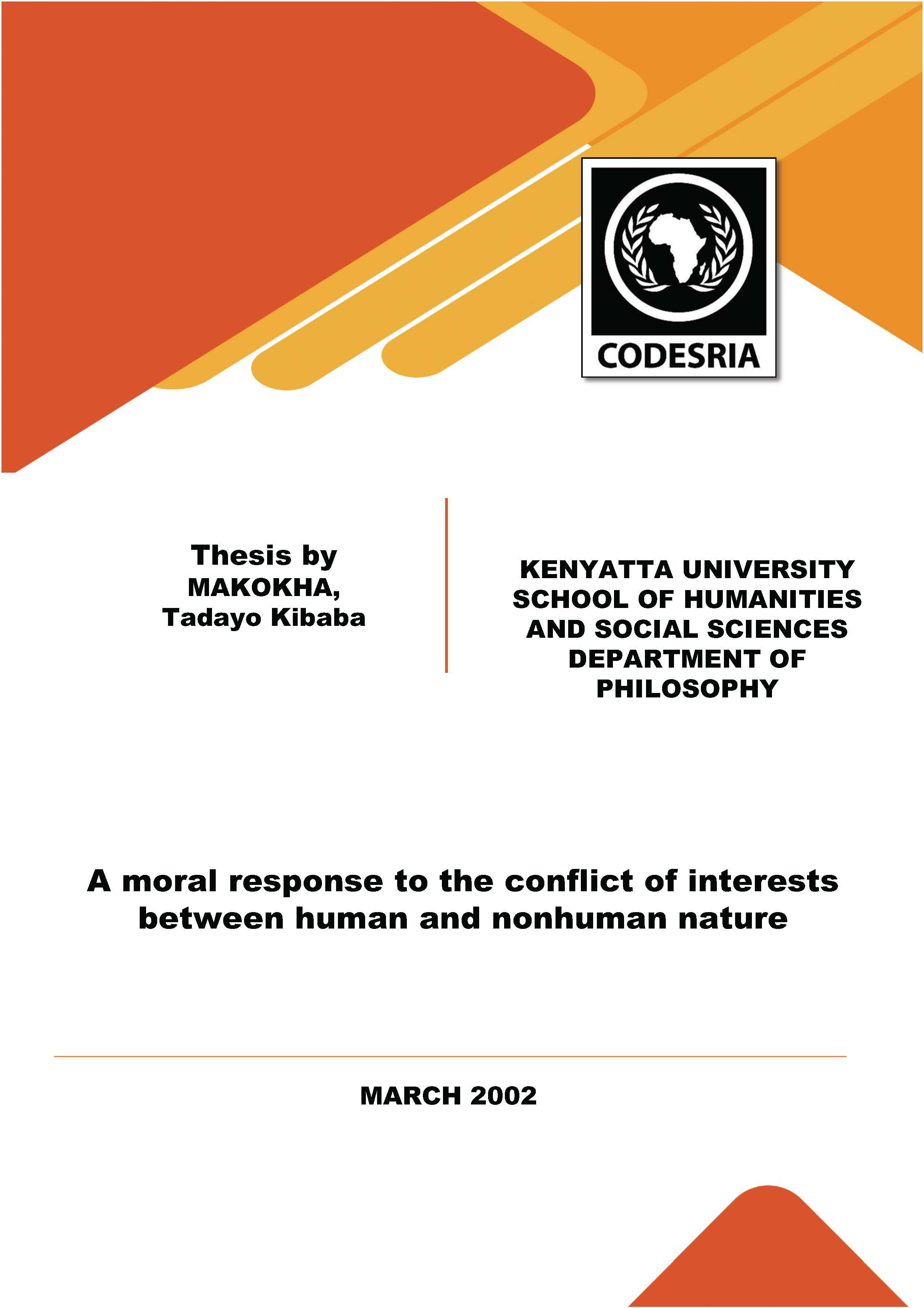A moral response to the conflict of interests between human and nonhuman nature
Keywords:
Ethics, human relations, environment, sustainable development morality, anthropocentrism, nonhuman nature, ethical values, environmental values, ecodevelopmentSynopsis
Environmental protection and care is increasingly becoming a major pre-occupation of many scholars and various fields of intellectual pursuit. This is mainly prompted by the current environmental crisis occasioned mainly by soaring human populations and increased capacity by human beings to interfere with the natural processes. This increased interference with nature has precipitated unprecedented increase in pollution in various forms, destruction of forests, problems of disposai of toxic wastes and garbage, extinction ofboth plant and animal species and so on. Thus, human beings have become pervasive, overwhelming and abusive to the natural environment. This raises serious ethical concems in particular; we discem serious conflict between humanity and nonhuman nature. It is against this backdrop that this study set out to argue for a moral intervention to the environmental crisis. The study is premised on the centrality of morality in harmonization of relationships, as exemplified in human relationships. The present study has endeavoured to demonstrate that ethical relationships
transcend human to human to include the human to nonhuman nature category. Hence, the question of conflict applies to human to nonhuman nature relationship in as much as it does to human relationships. The central thesis of the study is anchored on the moral standing of nonhuman nature; the view that nonhuman beings have a value of their own, upon which their interests and well-being are predicated. It is on the basis of this that we have argued for the extension of moral considerability to nonhuman nature. We have also endeavoured to concretis~ our thesis within the specific context of an
African worldview to test the validity of some of our arguments. Specifically, a reconstruction of Bukusu environmental ethical values gathered through intensive oral interviews reveals an ethic, which recognizes intrinsic value in nonhuman nature, while
emphasizing the unique place of humanity in nature. Thus, the ensuing ethic is in pursuit of principles aimed at achieving ecological balance and harmony. This is perfectly in line with one of the central functions of morality, namely, harmonizing relationshlps. In addition, these findings perfectly fit into and reinforce the conceptual paradigm of ecosustainability, identified, clarified and argued for in thls thesis. In sum, the thesis is structured as follows: Chapter one outlines the general introduction, purpose, and scope of the study. Chapter two, explores the centrality of the institution of morality in relationships involving humans, setting the ground for the central thesis of thls study, namely, to invoke moral reasoning and guidance in attempt to surmount conflicts between humans and nonhuman nature. Chapter three endeavours to clarify the problematic and controversial question of the basis of moral concem for nonhuman nature, thus grounding moral intervention in human
- nonhuman nature relationship. Chapter four, by way of exemplification reconstructs Bukusu environmental values as a
way of concretising some of the central ~rguments of the study and as a contribution towards an understanding or theory of environmental ethics. Chapter five on the other hand interrogates prevailing theoretical formulations in environmental ethlcs, with the view to showing their weaknesses in articulating human - nonhuman nature relationshlp. Then we present our considered conceptual framework of ecosustainability as this study' s contribution towards an understanding of environmental
ethics. Chapter six in a recap, attempts self - assessment particularly in the light of the objectives and assumptions of the study, summarizes and concludes the main arguments of the study, with a final note on the recommendations and the way forward.
Downloads
References
"What is Environmental Ethic" in The Rights of Nature: A History of Environmental Ethics by Roderick Nash. Wisconsin: The University of Wisconsin Press.
"Ethics" in David C. Pitt (ed) The Future of the Environment London: Routledge.
"Heidegger: The Man Nature Problem" in George McLean and Hugo Meynell (eds.) Person and ature New York: University Press of America.
}'oward a Transpersonal Ecology: Devefoping New Foundations for Environmentalism .Boston and London: Shambhala Publications Inc. Basic Concepts in Ethics Nairobi: Focus Book:,.
Ethics (2ⁿᵈ Edition) New Delhi: Prentice Hall of India Private Limited Morality and Conflict Oxford: Basil Blackwell.
"Science and Nature" in George McLean and Hugo Meynell (eds.) Person and Nature New York: University Press of America.
Being and Time Translated by John Macquarrie and Edward Robinson. New York: Harper and Row Publishers.
"Ideals of Human Excellence and Preserving the Natural Environment" in Lori Gruen and Dale Jameison (eds.) Reflecting on Nature Oxford: Oxford University Press
"The Ethical Assessment of New Technologies: Some Methodological Considerations" in Wim Zweers and Jan Boersema (eds.) Ecology, Technology and Culture: Essays in Environmental Philosophy. Cambridge: Vhite
Horse Press.






